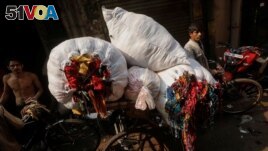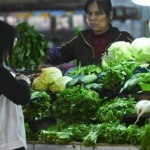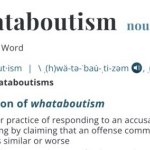09 November 2021
An Indian designer is repurposing unused pieces of cloth that factories throw out. Kriti Tula pieces together clothing for men and women as a sustainable choice for high-end clothes.
The New Delhi-based designer's high-end clothing company is called Doodlage. She and her workers collect unwanted fabric from factories that is rejected for minor problems. They then piece together the fabric to create clothes like dresses and sarees, which is a traditional form of Indian dress. They sell for about $100 a piece.
Her company also includes clothing for men. It has shirts that are made from small pieces of different fabrics that are put together to create one piece. One of the fabrics used on these shirts is denim.
Tula said the company was started out of her concern for climate change and the fashion industry's effects on the environment.

A man is transporting unused leftover fabric from factories at a market in New Delhi, India, November 4, 2021. The fabric will be repurposed to create high-end sustainable clothes. (REUTERS/Adnan Abidi)
Tula has worked at large clothing export businesses. She said she saw at those businesses the environmental cost of high fashion. She saw the waste of cloth and water, and the harmful chemicals that are used in the production process.
Tula told Reuters that everything we wear at some point "... impacts everything that we eat and consume and we breathe."
The world's $2.4 trillion fashion industry is responsible for 8 to 10 percent of the world's greenhouse gas production. The United Nations Environment Program said in 2019 that this is more than all international flights and sea shipping combined.
It added that the industry is also the second-biggest user of water. It produces 20 percent of all the world's used water.
Tula said finding the cloth that factories throw out was difficult at first. She added that the product prices had to be higher than what many buyers may have felt they should be paying for re-used clothes.
However, she said that her business slowly found sellers and partners who liked her environmental concerns.
Her company also makes soft playthings for children, paper made from leftover fabric, and pieces that carry objects like bags and purses.
I'm Gregory Stachel.
Sunil Kataria reported this story for Reuters. Gregory Stachel adapted it for VOA Learning English. Susan Shand was the editor.
_
Words in This Story
sustainable – adj. involving methods that do not completely use up or destroy natural resources
fabric – n. woven or knitted material: cloth
denim – n. a strong usually blue cotton cloth that is used especially to make jeans
fashion – n. the business of creating and selling clothes in new styles
impact – v. to have a strong and often bad effect on (something or someone): affect
consume – v. to eat or drink (something)














